牛津译林版九年级上册 Unit 5 Art world Study skills Guessing the meaning of a word from the context 课件 (共25张PP
文档属性
| 名称 | 牛津译林版九年级上册 Unit 5 Art world Study skills Guessing the meaning of a word from the context 课件 (共25张PP |  | |
| 格式 | ppt | ||
| 文件大小 | 351.5KB | ||
| 资源类型 | 教案 | ||
| 版本资源 | 牛津译林版 | ||
| 科目 | 英语 | ||
| 更新时间 | 2022-12-22 11:57:46 | ||
图片预览

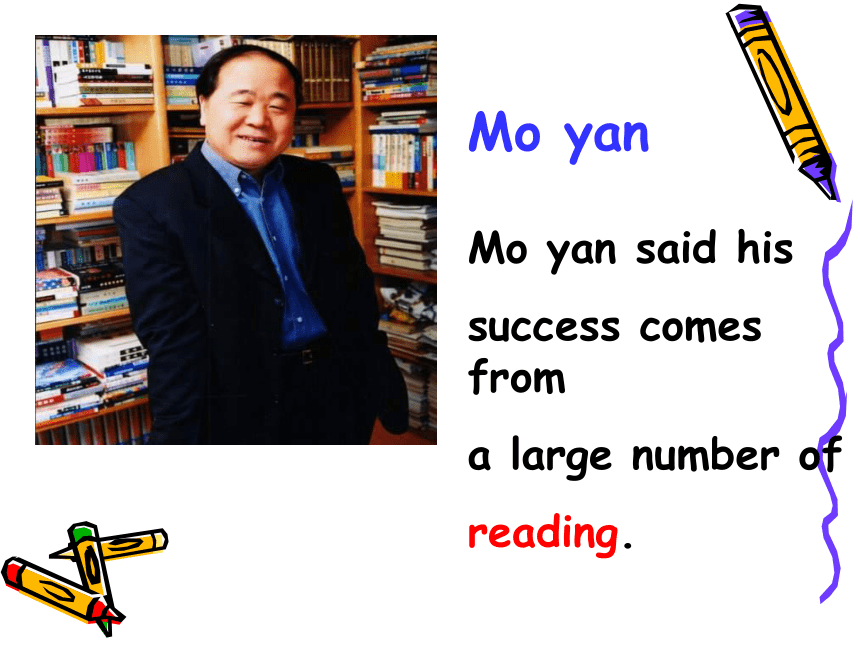
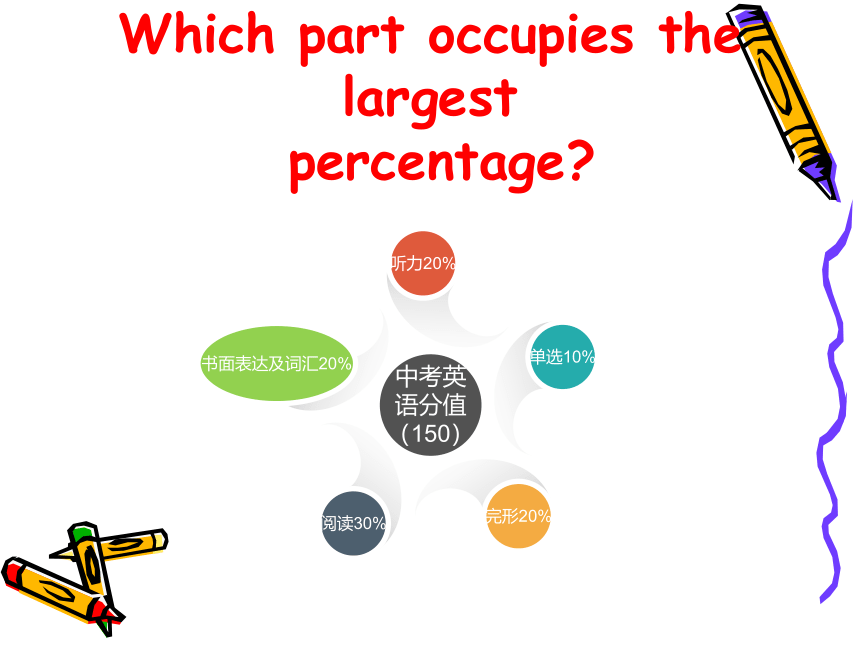
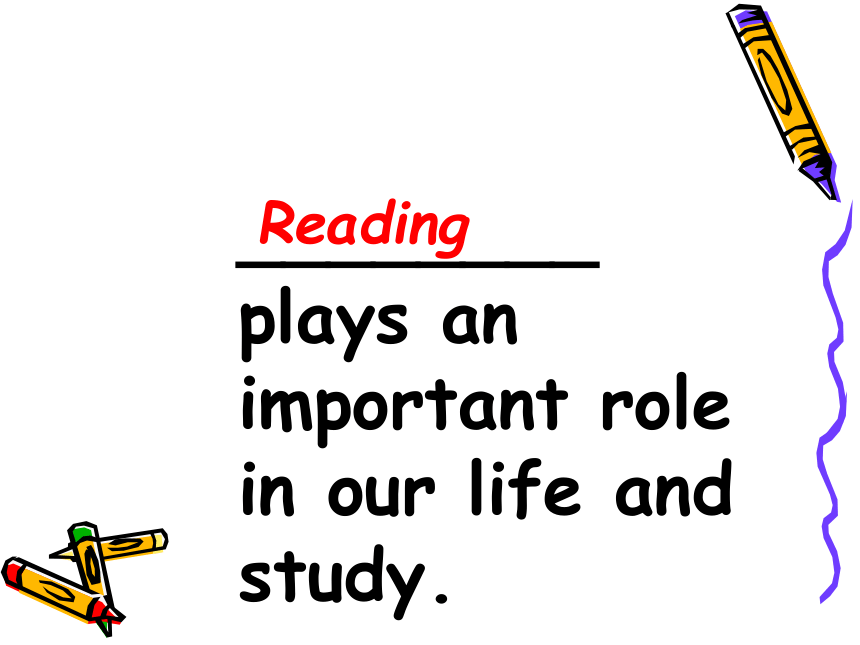

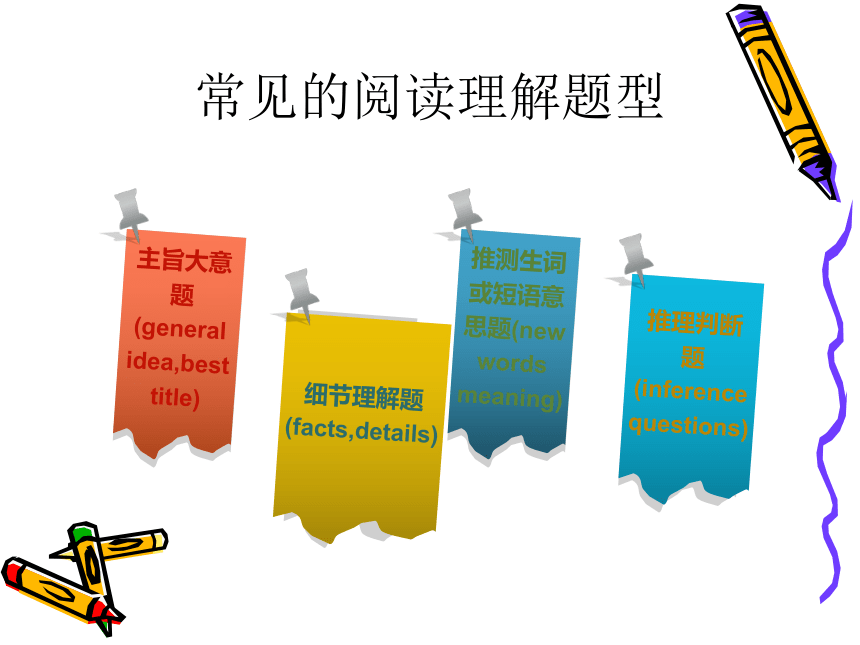
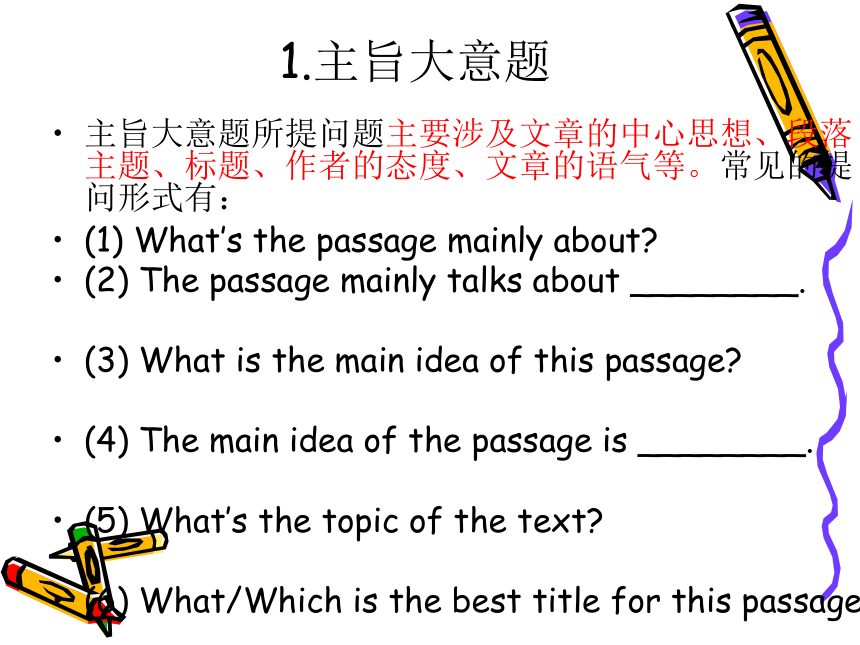

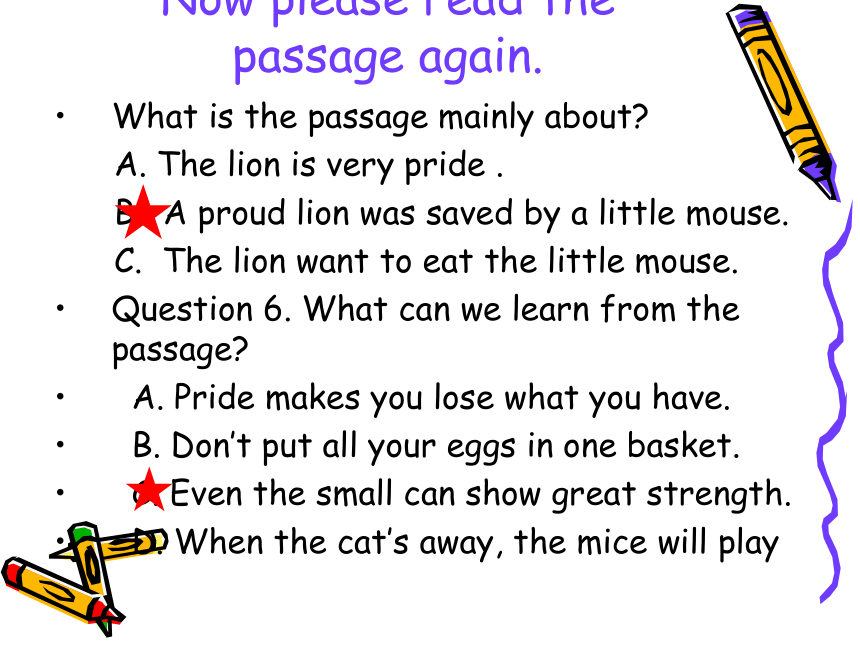
文档简介
(共25张PPT)
The strategies and skills
of reading comprehension
Mo yan
Mo yan said his
success comes from
a large number of
reading.
Which part occupies the largest
percentage
中考英语分值(150)
书面表达及词汇20%
听力20%
单选10%
完形20%
阅读30%
________ plays an important role in our life and study.
Reading
Now let us read the first passage in the reading sheet, and answer some questions.
1.How many animals in the passage
Two
2.Did the lion realize his mistake at the end
Yes,he did.
常见的阅读理解题型
主旨大意题(general idea,best title)
细节理解题(facts,details)
推测生词或短语意思题(new words meaning)
推理判断题(inferencequestions)
1.主旨大意题
主旨大意题所提问题主要涉及文章的中心思想、段落主题、标题、作者的态度、文章的语气等。常见的提问形式有:
(1) What’s the passage mainly about
(2) The passage mainly talks about ________.
(3) What is the main idea of this passage
(4) The main idea of the passage is ________.
(5) What’s the topic of the text
(6) What/Which is the best title for this passage
In what way can we work out this question patterns
1.Read the passage quickly, find out the general ideas or the topic sentence.
2.Pay attention to the beginning and the end of the passage.
Now please read the passage again.
What is the passage mainly about
A. The lion is very pride .
B. A proud lion was saved by a little mouse.
C. The lion want to eat the little mouse.
Question 6. What can we learn from the passage
A. Pride makes you lose what you have.
B. Don’t put all your eggs in one basket.
C. Even the small can show great strength.
D. When the cat’s away, the mice will play
★
★
2.细节理解题
细节理解题一般针对某个特定的细节而提出,属浅层理解,通过通读全文后可以直接找出答题依据。细节理解题有三种题型:纯细节题、计算题、细节推断题。细节理解题在阅读理解中占相当大的比重,涉及的内容很广,如时间、地点、人物、数字、原因、结果等。常见的提问方式有:
(1) How many/how much…
(2) What color…
(3) Who …
(4) When do they…
(5) Where is/are …
Solutions
Be careful,
Be more careful
Question 1. What did Lion do each day
A. He stepped onto a hunter’s net.
B. He bowed before weaker animals.
C. He showed kindness to animals in the jungle.
D. He had a good sleep under his favourite tree.
Question 2. How did Mouse wake up Lion
A. He made a hole in the net.
B. He shouted at Lion angrily.
C. He tripped over Lion’s paws.
D. He prepared a delicious meal for Lion.
★
★
3.词义猜测题
词义猜测题主要考查文章中出现的词、词组或句子的含义。词和词组的考查要求学生推测出生词的中文意思或其近义词或短语的引申意义,而句子则考查根据上下文推测整句话的含义。对生词的考查针对的是对文中超纲词汇、一词多义、熟词生意等意义的准确理解,这就要求学生通过阅读文章,推测出该词在句中的确切含义。常见的设问方式有:
(1) The word… in the passage means ________.
(2) The word “…” is closest in meaning to ________.
(3) The underlined word “…” means __________.
(4) What is the Chinese meaning of the word “…”
(5) The underlined part in the second paragraph means _______.
How can we guess the meaning of the new words
1.构词法(word-building)
主要形式有派生,转化,合成。
派生主要指单词通过加前缀和后缀,构成一个新的单词。如否定前缀un-,dis-,im-.in-,名词缀-ment,-ure等。
Practice makes perfect!
I won’t successfully get out of the trouble without your encouragement.
A.发展 B.判断 C.鼓励
▲
2.通过反义词、近义词等来推断词义。
The old woman have a strange habit to keep over 100 cats in her house. So her neighbours also call her a eccentric lady .
A. 闲不住的 B. 古怪的 C.爱猫的
Exercise:
he is so homely, not at all as handsome as his brother.
A.爱家的 B.相貌平庸的 C.和蔼的
▲
▲
3.通过定语从句来猜测词义。
Exercises: A carpenter ,who is skilled at making or repairing wooden objects .
木匠
A plumber is someone who knows how to fix broken pipes.
管道工
4.通过上下文猜测词义。
Question 4.What is the Chinese meaning of twisted
A.取笑 B.扭动 C.哭泣 D.求助
Exercises:
1.The old man put on his spectacles and began to read.
A.帽子 B.雨靴 C.眼镜
2.He is a resolute man. Once he decided to do something ,he would never give up halfway.
A. strong B. firm C. kind
▲
★
★
4.推理判断题
推理判断题要求学生根据阅读材料所提供的信息,透过文章的字里行间,对作者的话进行推理判断,从而推断出未知的信息。此类题目在文章中没有明确的答案,需要学生在理解全文的基础上进行推理和判断。常见的提问方式有:
(1) From the story we can guess __________.
(2) The writer writes this text to ___________.
(3) The writer suggests that ____________.
(4) We can learn from this passage that ___________.
(5) We can infer (推断) from the passage that ___________.
(6) It can be seen from the passage that __________.
(7) What can we know from the passage
(8) From the passage we know that ___________.
Question 3. Why did Lion let Mouse go
A. Because he was trapped in the net.
B. Because he took Mouse as his good friend.
C. Because he believed Mouse could save him.
D. Because he doubted if Mouse could be of any help.
Question 5. What do you think of Mouse
A. Clever and honest.
B. Silly and lazy.
C. Humorous and stubborn.
D. Proud and selfish.
★
★
More practice
Believe in yourself! Do the other reading comprehension with the strategies and skills we have learnt!
Group Discussion
How to improve the skills of reading
Some suggestions about reading
1.Enlarge your vocabularies.
2. Master the grammar.
3. Expand Cultural background knowledge of English
4 Keep reading
5 Use the strategies and skills the teacher has taught you.
The strategies and skills
of reading comprehension
Mo yan
Mo yan said his
success comes from
a large number of
reading.
Which part occupies the largest
percentage
中考英语分值(150)
书面表达及词汇20%
听力20%
单选10%
完形20%
阅读30%
________ plays an important role in our life and study.
Reading
Now let us read the first passage in the reading sheet, and answer some questions.
1.How many animals in the passage
Two
2.Did the lion realize his mistake at the end
Yes,he did.
常见的阅读理解题型
主旨大意题(general idea,best title)
细节理解题(facts,details)
推测生词或短语意思题(new words meaning)
推理判断题(inferencequestions)
1.主旨大意题
主旨大意题所提问题主要涉及文章的中心思想、段落主题、标题、作者的态度、文章的语气等。常见的提问形式有:
(1) What’s the passage mainly about
(2) The passage mainly talks about ________.
(3) What is the main idea of this passage
(4) The main idea of the passage is ________.
(5) What’s the topic of the text
(6) What/Which is the best title for this passage
In what way can we work out this question patterns
1.Read the passage quickly, find out the general ideas or the topic sentence.
2.Pay attention to the beginning and the end of the passage.
Now please read the passage again.
What is the passage mainly about
A. The lion is very pride .
B. A proud lion was saved by a little mouse.
C. The lion want to eat the little mouse.
Question 6. What can we learn from the passage
A. Pride makes you lose what you have.
B. Don’t put all your eggs in one basket.
C. Even the small can show great strength.
D. When the cat’s away, the mice will play
★
★
2.细节理解题
细节理解题一般针对某个特定的细节而提出,属浅层理解,通过通读全文后可以直接找出答题依据。细节理解题有三种题型:纯细节题、计算题、细节推断题。细节理解题在阅读理解中占相当大的比重,涉及的内容很广,如时间、地点、人物、数字、原因、结果等。常见的提问方式有:
(1) How many/how much…
(2) What color…
(3) Who …
(4) When do they…
(5) Where is/are …
Solutions
Be careful,
Be more careful
Question 1. What did Lion do each day
A. He stepped onto a hunter’s net.
B. He bowed before weaker animals.
C. He showed kindness to animals in the jungle.
D. He had a good sleep under his favourite tree.
Question 2. How did Mouse wake up Lion
A. He made a hole in the net.
B. He shouted at Lion angrily.
C. He tripped over Lion’s paws.
D. He prepared a delicious meal for Lion.
★
★
3.词义猜测题
词义猜测题主要考查文章中出现的词、词组或句子的含义。词和词组的考查要求学生推测出生词的中文意思或其近义词或短语的引申意义,而句子则考查根据上下文推测整句话的含义。对生词的考查针对的是对文中超纲词汇、一词多义、熟词生意等意义的准确理解,这就要求学生通过阅读文章,推测出该词在句中的确切含义。常见的设问方式有:
(1) The word… in the passage means ________.
(2) The word “…” is closest in meaning to ________.
(3) The underlined word “…” means __________.
(4) What is the Chinese meaning of the word “…”
(5) The underlined part in the second paragraph means _______.
How can we guess the meaning of the new words
1.构词法(word-building)
主要形式有派生,转化,合成。
派生主要指单词通过加前缀和后缀,构成一个新的单词。如否定前缀un-,dis-,im-.in-,名词缀-ment,-ure等。
Practice makes perfect!
I won’t successfully get out of the trouble without your encouragement.
A.发展 B.判断 C.鼓励
▲
2.通过反义词、近义词等来推断词义。
The old woman have a strange habit to keep over 100 cats in her house. So her neighbours also call her a eccentric lady .
A. 闲不住的 B. 古怪的 C.爱猫的
Exercise:
he is so homely, not at all as handsome as his brother.
A.爱家的 B.相貌平庸的 C.和蔼的
▲
▲
3.通过定语从句来猜测词义。
Exercises: A carpenter ,who is skilled at making or repairing wooden objects .
木匠
A plumber is someone who knows how to fix broken pipes.
管道工
4.通过上下文猜测词义。
Question 4.What is the Chinese meaning of twisted
A.取笑 B.扭动 C.哭泣 D.求助
Exercises:
1.The old man put on his spectacles and began to read.
A.帽子 B.雨靴 C.眼镜
2.He is a resolute man. Once he decided to do something ,he would never give up halfway.
A. strong B. firm C. kind
▲
★
★
4.推理判断题
推理判断题要求学生根据阅读材料所提供的信息,透过文章的字里行间,对作者的话进行推理判断,从而推断出未知的信息。此类题目在文章中没有明确的答案,需要学生在理解全文的基础上进行推理和判断。常见的提问方式有:
(1) From the story we can guess __________.
(2) The writer writes this text to ___________.
(3) The writer suggests that ____________.
(4) We can learn from this passage that ___________.
(5) We can infer (推断) from the passage that ___________.
(6) It can be seen from the passage that __________.
(7) What can we know from the passage
(8) From the passage we know that ___________.
Question 3. Why did Lion let Mouse go
A. Because he was trapped in the net.
B. Because he took Mouse as his good friend.
C. Because he believed Mouse could save him.
D. Because he doubted if Mouse could be of any help.
Question 5. What do you think of Mouse
A. Clever and honest.
B. Silly and lazy.
C. Humorous and stubborn.
D. Proud and selfish.
★
★
More practice
Believe in yourself! Do the other reading comprehension with the strategies and skills we have learnt!
Group Discussion
How to improve the skills of reading
Some suggestions about reading
1.Enlarge your vocabularies.
2. Master the grammar.
3. Expand Cultural background knowledge of English
4 Keep reading
5 Use the strategies and skills the teacher has taught you.
